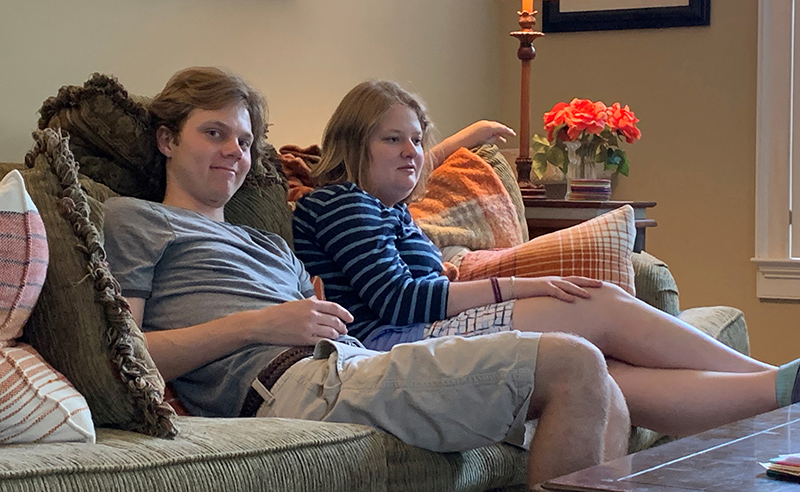In my profession, I often write articles from a parent’s perspective about having an 18-year-old daughter (Annie) with severe autism, and intellectual and developmental disabilities. My overarching goal with these stories is to provide compassion, understanding and hope to families, caregivers and professionals who may be in a similar situation.

Danny with his sister Annie
For more than 15 years, I’ve made it my mission to understand Annie’s diagnosis and provide her with a secure, happy and fulfilling future. Learning how to advocate not only for Annie but for all individuals with autism has aided in this mission. Becoming educated on the topic of autism also has been somewhat cathartic, as it allows me to feel as though I’m doing something to help Annie.
For Annie and countless others living with cognitive differences, there is no known cause, cure, predictable therapy or treatment regime guaranteed to ensure maximum impact. These truths can be extremely overwhelming for any parent or individual. These truths, however, also can be eye-opening.
My 19-year-old son, Danny, shared an essay about his personal journey with his sister – from a sibling’s perspective. It was similar to my own journey, yet uniquely different, and it could not go unseen (I did get his permission to reprint!):
A Sibling’s Perspective
“Haircut.”
“Yes, Annie, you will have a haircut on Tuesday.”
“Haircut.”
“Yes, Annie, I know.”
“Haircut … Haircut.”
Now, imagine this conversation continuing for four hours straight, while working on a crucial school assignment. All my life, I have lived with my sister, Annie, who has autism. Autism is a developmental disorder that affects the social interactions and communication of an individual. She means the world to me and is one of my biggest inspirations. Although I feel this way, the rest of society doesn’t always understand her in the way I do. Her disorder isn’t apparent in how she looks, but it is in how she acts. She struggles to communicate and gets very frustrated.
I am a firm believer that something positive comes out of every situation. Annie’s autism has served as a catalyst to change my own outlook on life. She has changed me as a person, shaped who I am, and has instilled three core values I hold above all else.
- The first value is patience. Every time I get frustrated with Annie, I imagine the struggle she undergoes every day that is infinitely harder than what I am going through. Annie has anxiety, in addition to autism, so she often repeats the same phrases, such as getting a haircut, over and over again because she needs to have a set schedule she follows every day. From this, I have learned to be patient with others and become less frustrated in the real world.
- The second value is perseverance in helping others. I am committed to helping my community and helping make people aware of individuals like Annie. This led me to volunteer in my community with organizations that help families with autism because I understand the difficulties families undergo in adjusting to living with a child diagnosed with autism. I also began volunteering with local political candidates in my area because political decisions play a major role in how children with disabilities are treated. I want Annie, and others with disabilities, to be treated fairly and with care.
- The final and most important value is kindness. Interacting with Annie has taught me to be kind to others. There are a lot of people in society who do not understand Annie and tease people who have this disorder or differences. As a result, I have learned to show, and treat others, with the respect I would want to see my sister treated. Without Annie in my life, I could have been just like those other people in society who do not understand. But she has allowed me to see people through a different lens and respect them for who they are as people. Every person should be kind, yet there are times when people are not kind to Annie, which disheartens me.
I care about Annie more than I care about anything else in the world. Not just because she is my sister, but because she created my compassionate personality. While I used to wish she didn’t have autism, I have used this to change the way I interact with others. Annie’s influence spreads into every aspect of my life, and she has given me the inspiration to make an impact in the world around me.
Conclusion
As a mother, and as a professional in the behavioral healthcare field, this essay reminded me that siblings experience the same feelings and issues that caregivers and parents experience.
And to Danny: thank you for this wonderful essay about your sister. Annie is so lucky to have you and Ryan as her brothers. You make me so proud, and my heart so warm.
Amy Kelly, MBA, MNM, is the mother to Danny, Annie and Ryan. Annie is diagnosed with moderate to severe autism, verbal apraxia, intellectual and developmental disabilities and general anxiety disorder. Amy is the National Director of Family Engagement for Devereux Advanced Behavioral Health, one of the nation’s oldest and largest nonprofit providers of behavioral healthcare, and serves as a family representative on several special needs boards in the community, locally and nationally. In addition, she participates with other patients and families in efforts supported by the American Board of Pediatrics Foundation and the Autism Speaks Autism Treatment Network to address children with special needs and the importance of quality care.





[…] Amy Kelly, learns about the sibling perspective from her son in Autism Through a Different Lens: A Sibling’s Perspective on Autism Spectrum […]